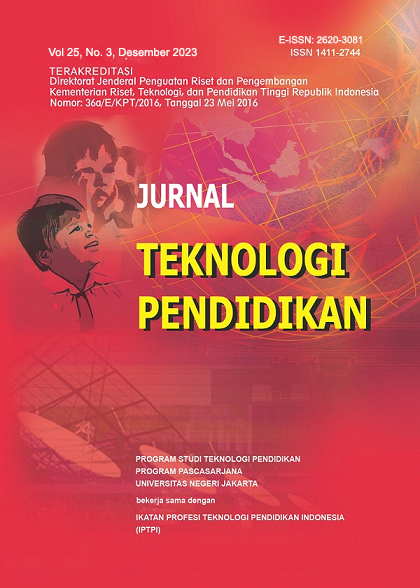The Effect of Modified Flipped Classroom Learning Assisted Students' Worksheets on English Reading Comprehension
DOI:
https://doi.org/10.21009/jtp.v25i3.49846Keywords:
Modified Flipped Classroom, Student Worksheet, English Reading ComprehensionAbstract
The flipped classroom is a possible learning model solution that can be used occasionally. With modification through various media tailored to students' needs, the modified flipped classroom has been proven to improve motivation and results. Studying in English lessons is at the upper middle level. This research aims to identify the influence of learning that a modified flipped classroom helps student worksheets toward English reading comprehension. This research applies quasi-research with a pre-test and post-test control group design. The participants in this research were 89 students. The experimental group (N=44) was taught to use a modified flipped Classroom, and the temporary control group (N=45) was taught to use a flipped Classroom. The researcher used statistical tests factorial anova and found a different understanding of significant reading between the two groups, Where the group that used the modified flipped classroom obtained better results. Research findings: the author tried to conclude that there is a difference in English reading comprehension between group students who received treatment by applying the modified flipped classroom model and those who obtained treatment using the flipped classroom model.
References
Awidi, I., & Paynter, M. (2019). The impact of a flipped classroom approach on student learning experience. Computers & Education, 126, 269–283. https://doi.org/10.1016/j.compedu.2018.09.013
Basal, A. (2015). The Implementation of a Flipped Classroom in Foreign Language Teaching. Turkish Online Journal of Distance Education, 16(4), 28–37.
Bond, M., Bedenlier, S., Marín, V. I., & Händel, M. (2021). Emergency remote teaching in higher education: Mapping the first global online semester. International Journal of Educational Technology in Higher Education, 18(1), 50. https://doi.org/10.1186/s41239-021-00282-x
Creswell, J. W., & Creswell, J. D. (2017). Research Design: Qualitative, Quantitative, and Mixed Methods Approaches. SAGE Publications.
Degeng, I. N. S. (1997). Strategi Pembelajaran (Mengorganisasi Isi dengan Model Elaborasi). IKIP Malang.
Diningrat, S. W. M. D. (2022). Pengaruh model pembelajaran flipped classroom integrated with reciprocal strategy (fcirs) dan working memory capacity terhadap kemampuan reading comprehension dan critical reading / Syaiputra Wahyuda Meisa Diningrat [Doctoral, Universitas Negeri Malang]. https://repository.um.ac.id/271799/
Garrett, T. (2008). Student-Centered and Teacher-Centered Classroom Management: A Case Study of Three Elementary Teachers. Journal of Classroom Interaction, 43(1), 34–47.
Girmen, P., & Kaya, M. F. (2019). Using the Flipped Classroom Model in the Development of Basic Language Skills and Enriching Activities: Digital Stories and Games. International Journal of Instruction, 12(1), 555–572.
Hew, K. F., Jia, C., Gonda, D. E., & Bai, S. (2020). Transitioning to the “new normal” of learning in unpredictable times: Pedagogical practices and learning performance in fully online flipped classrooms. International Journal of Educational Technology in Higher Education, 17(1), 57. https://doi.org/10.1186/s41239-020-00234-x
Kinteki, R. (2019). Pengaruh model pembelajaran flipped classroom dan self efficacy terhadap hasil belajar pemahaman dan penerapan konsep hidrologi / Retno Kinteki [Universitas Negeri Malang. Program Studi Teknologi Pembelajaran]. //mulok.lib.um.ac.id%2Findex.php%3Fp%3Dshow_detail%26id%3D95355%26keywords%3D
Lin, L.-C., Hung, I.-C., Kinshuk, & Chen, N.-S. (2019). The impact of student engagement on learning outcomes in a cyber-flipped course. Educational Technology Research and Development, 67(6), 1573–1591. https://doi.org/10.1007/s11423-019-09698-9
Ma, W., & Luo, Q. (2022). Pedagogical practice and students’ perceptions of fully online flipped instruction during COVID-19. Oxford Review of Education, 48(3), 400–420. https://doi.org/10.1080/03054985.2021.1994382
Mubarok, A. F., Cahyono, B. Y., & Astuti, U. P. (2019). Effect of Flipped Classroom Model on Indonesian EFL Students’ Writing Achievement across Cognitive Styles. Dinamika Ilmu, 19(1), 115–131.
Olakanmi, E. (2017). The Effects of a Flipped Classroom Model of Instruction on Students’ Performance and Attitudes Towards Chemistry. Journal of Science Education and Technology, 26(1). https://doi.org/10.1007/s10956-016-9657-x
Reflianto, Setyosari, P., Kuswandi, D., & Widiati, U. (2021). Reading Comprehension Skills: The Effect of Online Flipped Classroom Learning and Student Engagement during the COVID-19 Pandemic. European Journal of Educational Research, 10(4), 1613–1624.
Reigeluth, C. M., & An, Y. (2021). Merging the Instructional Design Process with Learner-Centered Theory The Holistic 4D Model. Routledge.
Santrock, J. W. (2019). Educational Psychology (5th ed.). McGraw-Hill.
Slavin, R. E. (2008). Psikologi Pendidikan: Teori dan Praktik. Terjemahan oleh Samosir Marianto. PT. Indeks.
Tuckman, B. W. (1999). Conducting Educational Research. Harcourt Brace College Publishers.
Winter, J. W. (2018). Performance and Motivation in a Middle School Flipped Learning Course. TechTrends, 62(2), 176–183. https://doi.org/10.1007/s11528-017-0228-7
Downloads
Published
How to Cite
Issue
Section
License
Copyright (c) 2024 Kiswati Kiswati, Punaji Setyosari, Dedi Kuswandi, Nunung Suryati

This work is licensed under a Creative Commons Attribution-ShareAlike 4.0 International License.
Jurnal Teknologi Pendidikan is an Open Access Journal. The authors who publish the manuscript in Jurnal Teknologi Pendidikan agree to the following terms.
Attribution-ShareAlike 4.0 International (CC BY-SA 4.0)
-
Attribution — You must give appropriate credit, provide a link to the license, and indicate if changes were made. You may do so in any reasonable manner, but not in any way that suggests the licensor endorses you or your use.
-
ShareAlike — If you remix, transform, or build upon the material, you must distribute your contributions under the same license as the original.
- No additional restrictions — You may not apply legal terms or technological measures that legally restrict others from doing anything the license permits.
Notices:
- You do not have to comply with the license for elements of the material in the public domain or where your use is permitted by an applicable exception or limitation.
- No warranties are given. The license may not give you all of the permissions necessary for your intended use. For example, other rights such as publicity, privacy, or moral rights may limit how you use the material.








